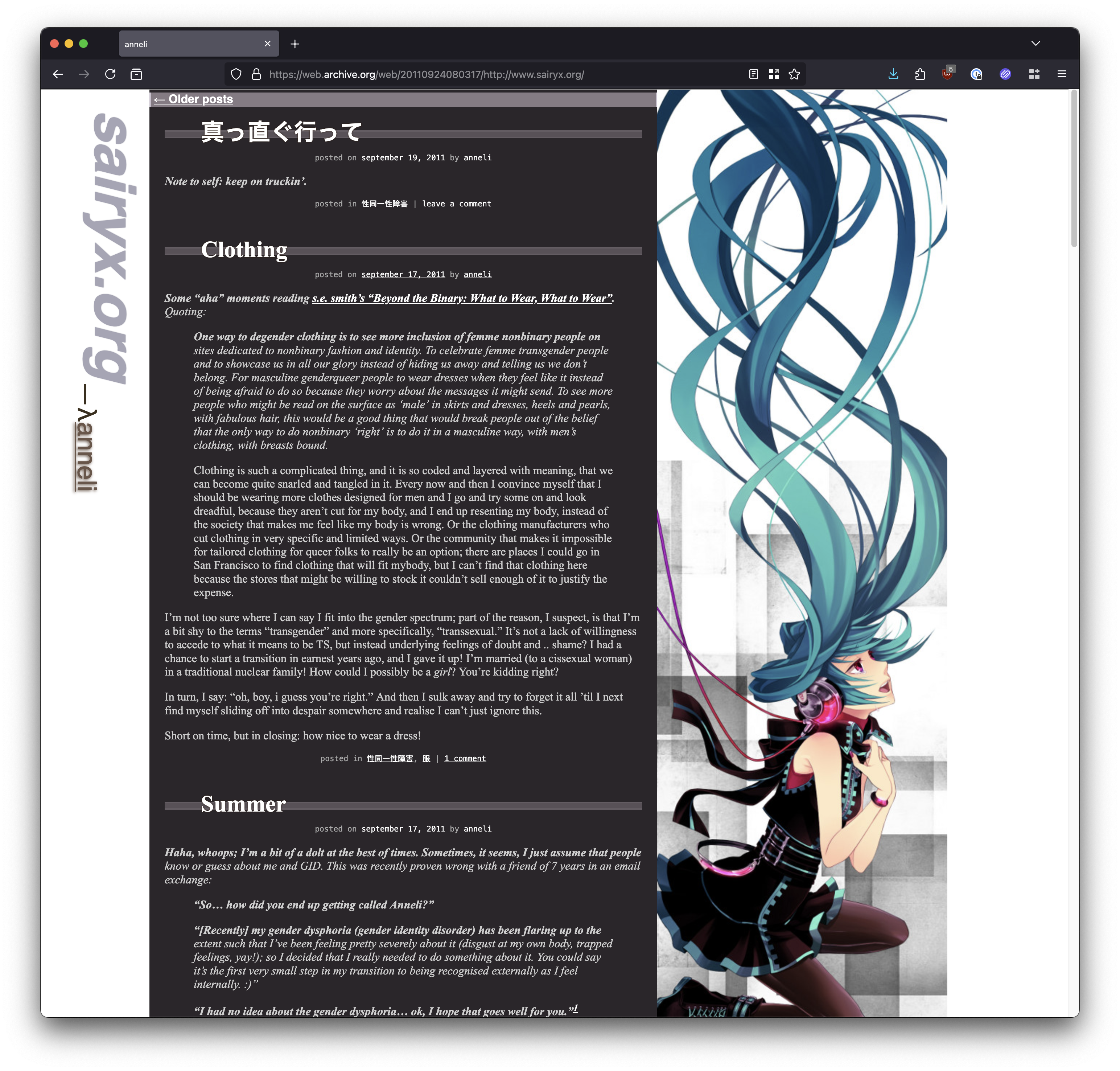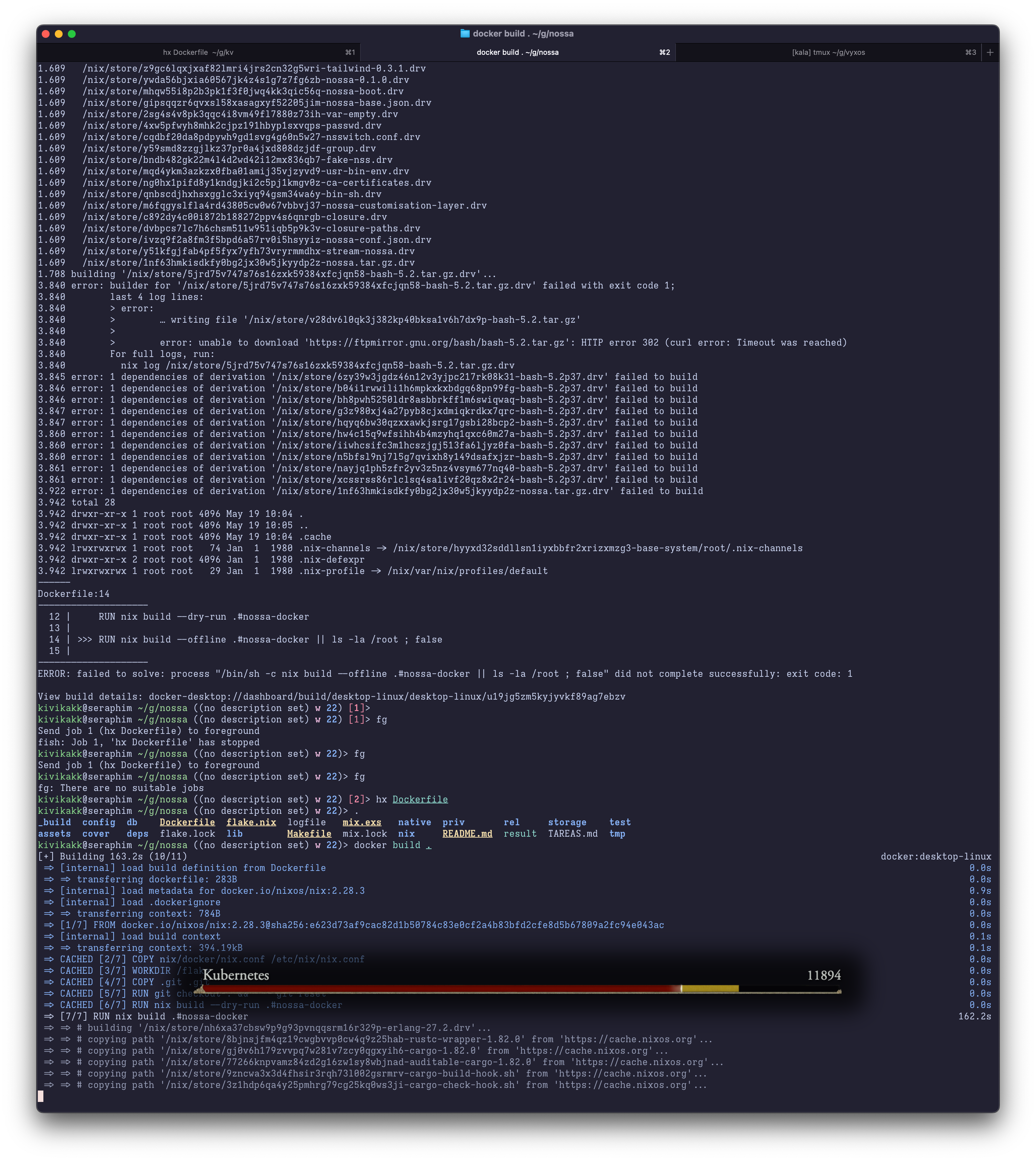Noodling away at what has motivated the things I’ve chosen to do lately.
This seems like a fruitful endeavour directly because I’ve been so limited in my ability lately; what have I prioritised? What, empirically, drives me when nothing else can? I struggle so much with self-knowledge — which is, at its heart, a weird “rendering” of the equally true/first-person point-of-view statement “I struggle with a lack/surplus of identity”1 — that revealed preference is a very powerful source of uncluttered information.
I’ve been angling to write more, doing things to make that feel nearer to hand, to lessen impedance; to exist publicly more, to be somewhere more. And it’s obvious, internally, that this is driven by a kind of mortality fear—pain is a signal, and I cannot help but react to it. But it’s obvious, too, that this is manifesting some kind of equal and corresponding oppression in the psychic dimension. Change is life is change.
Collecting old posts into one place feels, allegorically, like collecting every part of me that has existed and, at least, letting the pieces stand together at the end. I’m romanticising it a lot, really, but at the same time there is a me that experiences it with intensity. To collect oneself. It’s a bit of a quiet, sisterly companionship feeling. It’s a nice surprise, when you’re feeling this tired, to realise just how much you’ve done, how much you’ve experienced. Decades of being amongst yourself. You can feel held in that. It also gives a sense of being (able to be) seen to parts that might lack it.
There’s also a very peculiar sense of legacy. I have two kids; both in high school, now, getting to the age I was when I started to learn who I was. My marriage with their mother didn’t survive my transition. She and I both tried extremely hard — both very young, stupid parents — but ultimately I decided a line had been crossed when she threatened my life. The divorce and transition that both ensued were so incredibly rough. I had my first major breakdown within two months of my moving out of the family home, at times having 5 days of work and then a weekend of 2 days of solo parenting a 2yo and 6mo alone, having just turned 22, having started HRT 6 months earlier, with your marriage and feeling of security in being alive crashing down 6 months before that.
Like it was just a lot!! I was so unprepared. I was so unprepared for the depression, anxiety and trauma that was to come. My eldest brother called me to abuse me for my decision on multiple occasions, refusing to let me talk (!) or even have a moment to respond between salvos. My mum did her very best to be supportive, always, which I am always grateful for. My other older brother — the one I was closest to, growing up — became uncomfortable around me (which never changed again!).
That was 2013, and I just never really recovered. I would see my kids every few weeks, and as my general state of mental health would continue to suffer hits over the years to come — with the really big hits to follow in 2016 (capital-s Sick for >1y), 2017 (girlfriend suicide attempts), 2017 again (rape), 2018 (Sick rebound), 2022 (covid), 2023 again (auto-immune? + mould), 2023 (assault), 2024 (chronic pain starts) (HMM that was a longer list than I was expecting. and I am sure it is incomplete.) — I never became capable of more than that. And so as we have continued to know each other and see each other and love one another, I haven’t been a part of their life in a “normal parent” kind of way for more than 10 years at this stage. At least somewhere, once, I need to make sure it is written and known that I never wanted this.
So, making sure there is as much of what of me already exists out there, in a meaningful/significant way, in a place that’s linked together. It sounds a bit morbid, but I have spent my entire life as a programmer, having decided at an early age not to, as the child who was taught by her father, who looked up to him so much, who then had to deal with his suicide when she was 13, to deal with his never getting to know her and who she became. In so many ways, I turned out like him, both good and bad—and I mean that in a good way. I’ve struggled so much having so little chance to know him more, and I’d like to avoid committing the same mistakes, if possible. May this hang around and be found some day, and may I get to keep loving them for a long while yet.
I’ve spent a lot of time programming, almost feverishly at times. It feels like the one thing. I don’t know how to put that otherwise and still convey my meaning. It is my connection to the source right now2.
Meditation and Duolingo are kind of the same; minimum time spent every day towards an end. It’s very funny to me to put them together like that, but what they have in common is that they’re daily practices in a very pure kind of way. There: my revealed religion is the getitdone nature of Duo-ism. To be enlightened is just to be friends with all of existence. Etc. etc.
Work is another practice, with the added bonus of providing another kind of security which I am very childhood-intuned to care about. Two days a week, and I get to treat it as another meditation. I’m extremely privileged not to have this as a stressor.
Time that I’m not doing those things is the “everything else” of life, maybe so because those things don’t involve Annie, and anything else can; despite being very separate in the ways that define us, we live life as a pair. Despite (what I can only describe as) the massive ball of ennui that wants to numb me to everything, it’s really easy to feel motivated to keep our home feeling cosy, tidy, clean, etc. It’s nice to go get coffee together, or to get No Chicken & Lettuce sandwiches and Monster3 from 7/11 and say hi to Ajay. (Hi Ajay.) And League of Legends is so nice for our competitive side (though I have to admit, it has outsized effects on my general feeling about life when people are really nasty to each other on it).
I am doing the things that give me life. Nothing else really makes sense or matters right now.

